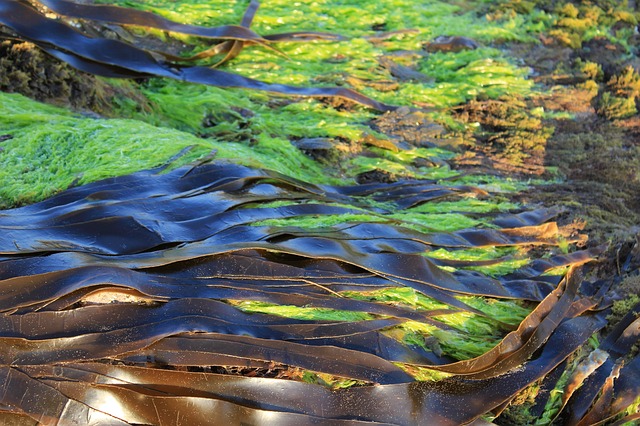 Various seaweeds are a part of the traditional Japanese diet. Seaweed is a rich source of nutrients and many contain unique chemical compositions that give them particular health effects. Some nutrients known to be present in seaweeds in high amounts include fiber, minerals, vitamins, polysaccharides, and iodine. Evidence suggests that seaweeds have anticoagulant, anti-viral, antioxidant, anti-allergic, anti-cancer, anti-inflammatory, anti-obesity, and neuroprotective properties. The health effects of seaweeds may include antidepressant effects. For example, in one study researchers investigated the association between seaweed consumption and the prevalence of depressive symptoms in pregnant Japanese. The results of the study showed that the general prevalence of depressive symptoms amongst the women was 19.3 %, but that amongst those women that regularly ate seaweed the rate of depressive symptoms was significantly lower and continued to fall as seaweed consumption rose.
Various seaweeds are a part of the traditional Japanese diet. Seaweed is a rich source of nutrients and many contain unique chemical compositions that give them particular health effects. Some nutrients known to be present in seaweeds in high amounts include fiber, minerals, vitamins, polysaccharides, and iodine. Evidence suggests that seaweeds have anticoagulant, anti-viral, antioxidant, anti-allergic, anti-cancer, anti-inflammatory, anti-obesity, and neuroprotective properties. The health effects of seaweeds may include antidepressant effects. For example, in one study researchers investigated the association between seaweed consumption and the prevalence of depressive symptoms in pregnant Japanese. The results of the study showed that the general prevalence of depressive symptoms amongst the women was 19.3 %, but that amongst those women that regularly ate seaweed the rate of depressive symptoms was significantly lower and continued to fall as seaweed consumption rose.

Higher seaweed consumption is independently associated with a lower prevalence of depressive symptoms during pregnancy in the Japanese population. Although it is difficult to increase the seaweed component of the diet due to a lack of availability in the Western nations, tablets containing whole extracts of certain seaweeds, such as kelp, are available.
Eat Well, Stay Healthy, Protect Yourself
RdB
